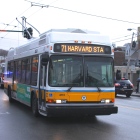Around Town
OP-ED: State Senator on the Bad Week for the MBTA
|
The following piece was written by State Sen. Will Brownsberger, who represents Watertown, Belmont and parts of Boston:
It has been a very bad week for the MBTA. Two train derailments injured dozens and massively inconvenienced hundreds of thousands of people.
As I write, no one seems to know yet how long it will take to repair critical signal systems that the derailed train destroyed. Red line riders may have to endure diminished service and extraordinary rush hour crowding for days or weeks. While expediting repairs, the MBTA has rightly brought in an outside consulting team to review the events. The legislature will take great interest in the results of that review.
For me, here is the big question: What will that review reveal about the work force and operational management of the MBTA? We knew that from time to time scheduled bus trips simply don’t happen because an employee doesn’t show up. We know that the MBTA’s derailment rate is high. We knew that a terrifying runaway train incident was triggered by an operator disabling a safety device. Investigators have already concluded that the recent green line derailment was operator error.
While safety is always nominally the number one mission of any transit agency, how strong is the safety culture really? Are line managers overextended and under too much pressure to deliver timely service with inadequate staffing? What do these incidents say about employee morale and discipline? As legislators, we tend to focus less on operational conditions, which are hard to evaluate from outside, and more on the issues of system repair and service expansion. My impression has been and remains that the MBTA’s board and leadership team have been doing a very good job in turning around a state of physical system decay that was produced by decades of inadequate investment.




